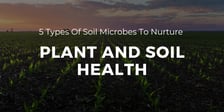By Kaitlyn Ersek on Apr 7, 2015 10:31:00 AM
-1%20(1).webp?width=770&height=385&name=Resize_Copy%2Bof%2BWWW.hOLGANIX.COM%2B(6)-1%20(1).webp)
There’s a lot of new terminology in the turf industry and definitions can be sketchy and downright confusing. So, what’s the difference between synthetic fertilizers, organic fertilizers and soil amendments?
At the end of the day, the key difference lies in the way the tool affects the plant. Synthetic fertilizers affect plant growth directly while soil amendments affect the plant indirectly (think soil structure and water infiltration). However, organic fertilizers can either directly affect plant growth or can be classified as a soil amendment and therefore affect the plant indirectly.
%20(1).webp?width=770&height=387&name=Resize_download%20(37)%20(1).webp)
Synthetic Fertilizers
According to the University of California Agriculture and Natural Resources, “synthetic fertilizers are chemically manufactured materials containing one or more of the primary nutrients necessary for plant growth: nitrogen, phosphorus and potassium.”
Government regulations may limit the use of synthetic fertilizers by turf professionals (golf course superintendents, lawn care companies and sports turf field managers).
Soil Amendments
On the other hand, soil amendments “modify the soil structure as they decompose, allowing it to absorb and retain water and nutrients more efficiently”. Soil amendments are usually derived by natural materials but in some instances can contain chemically manufactured products (think Gypsum).
Government regulations don’t limit the use of soil amendments by turf professionals because they do not contain nitrogen, phosphorus or potassium.
Organic Fertilizers
So where do organic fertilizers lie? Organic fertilizers can affect plant growth directly if they contain “significant quantities of one or more of the primary nutrients necessary for plant growth: nitrogen, phosphorus and potassium.”
In the case of organic fertilizer, nutrients are naturally occurring. Utilizing manure based products are an example of organic fertilizers that directly affect plant growth.
However, organic fertilizers can also affect the plant indirectly and therefore be considered soil amendments.
One thing to keep in mind is that when organic fertilizers contain any NPK, government regulations restrict their use by turf professionals.
Incorporating Microbials Like Holganix Bio 800+
Holganix Bio 800+ is a soil amendment that harnesses the power of over 800 species of soil microbes. Those microbes charge soils, improving the uptake of nutrients, stimulating root growth and fortifying plant strength against stressors like disease, weather, and traffic.
In fact, landscapers, golf superintendents, groundskeepers and farmers across the U.S. use Holganix Bio 800+ as an agronomic solution to not just improve plant response, but to also reduce their use of fertilizer.
Learn more about the science behind Holganix Bio 800+ by clicking on the button below.


![Holganix Greater Green Goal [2024 Update]](https://www.holganix.com/hs-fs/hubfs/Blog%20headers%20%232%20%2875%29.jpg?width=224&height=112&name=Blog%20headers%20%232%20%2875%29.jpg)



![Holganix Greater Green Goal [2024 Update]](https://www.holganix.com/hs-fs/hubfs/Blog%20headers%20%232%20%2875%29.jpg?width=120&height=66&name=Blog%20headers%20%232%20%2875%29.jpg)








